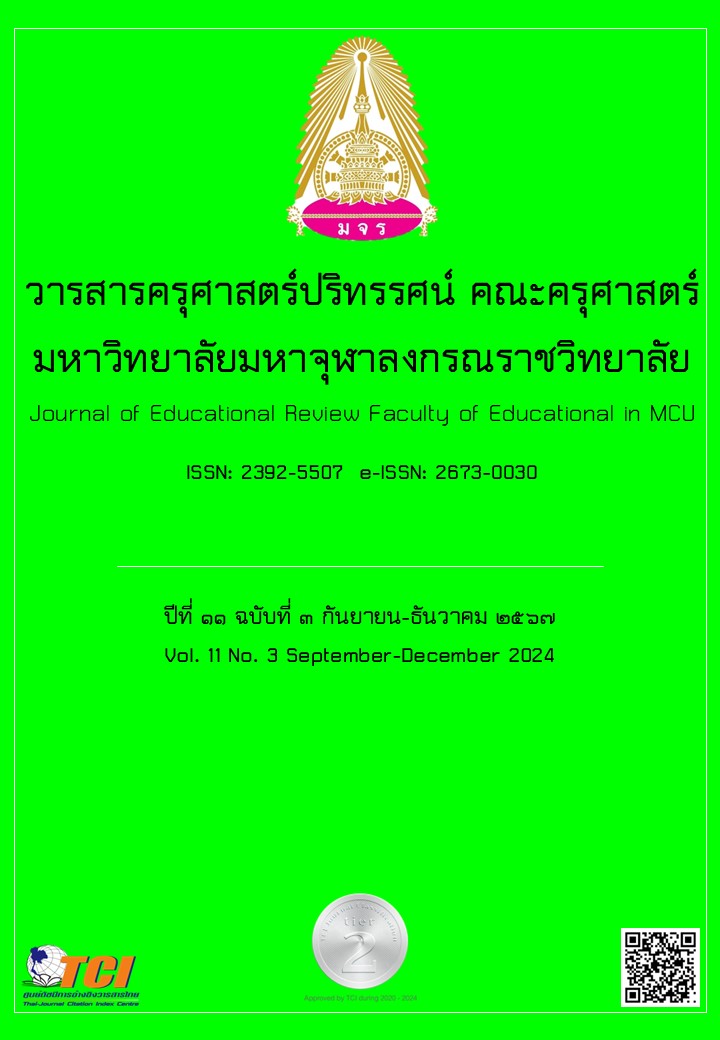AN EVALUATION OF COMMUNITY VOCATIONAL TRAINING PROJECT OF NAKHON SAWAN LEARNING ENCOURAGEMENT CENTER ACCORDING TO THE THREEFOLD TRAINING
Main Article Content
Abstract
This research aims 1) to create an evaluation tool for the development project of the community vocational training center and learning promotion center in Nakhon Sawan province based on the Tri-sikkh principle (Threefold learning) and 2) to evaluate the project of the community vocational training center and learning promotion center in Nakhon Sawan province using the evaluation model (CIPP Model) as a mixed-method research. The qualitative research used interviews with 9 key informants. Data were analyzed by content analysis. The quantitative research used a questionnaire with a sample of 285 project participants. The research instrument was a scale and rating evaluation form with a reliability coefficient of 0.96 for the entire document. Data were analyzed by using research statistics including frequency, percentage, mean, and standard deviation. The research results found that 1) the evaluation tools for the development project of the community vocational training center and learning promotion center in Nakhon Sawan province based on the Tri-sikkh principle included context evaluation, primary factor evaluation, process evaluation, and output evaluation based on the principles of Tri-sikkh . (1) Precepts: Compliance with rules, regulations, practices, announcements, orders, and laws; and (2) Concentration: Practice and training the mind to create virtue, determination and intention (3) Intelligence: Intelligence training, knowledge, ability and analytical thinking, evaluation of 10 items per aspect, totaling 40 items, and 2) the results of the evaluation of the Community Vocational Training Center Project, Learning Promotion Center, Nakhon Sawan Province, overall was at a high level. When considering each aspect, it was found that the aspect with the highest average value was the contextual evaluation aspect, followed by the process evaluation aspect, the product evaluation aspect, and the aspect with the lowest average value was the preliminary factor evaluation aspect, respectively.
Article Details

This work is licensed under a Creative Commons Attribution-NonCommercial-NoDerivatives 4.0 International License.
ทัศนะและความคิดเห็นที่ปรากฏในบทความในวารสารฉบับนี้ถือเป็นความรับผิดชอบของผู้เขียนบทความนั้นเพียงผู้เดียว และไม่ถือเป็นทัศนะและความรับผิดชอบของกองบรรณาธิการ
กองบรรณาธิการขอสงวนสิทธิ์ในการคัดเลือกบทความลงตีพิมพ์และจะแจ้งให้เจ้าของบทความทราบหลังจากผู้ประเมินบทความตรวจอ่านบทความแล้ว
ต้นฉบับที่ได้รับการตีพิมพ์ในวารสารครุศาสตร์ปริทรรศน์ คณะครุศาสตร์ มหาวิทยาลัยมหาจุฬาลงกรณราชวิทยาลัย ถือเป็นกรรมสิทธิ์ของคณะครุศาสตร์ มหาวิทยาลัยมหาจุฬาลงกรณราชวิทยาลัย ห้ามนำข้อความทั้งหมดหรือบางส่วนไปพิมพ์ซ้ำ เว้นเสียแต่ว่าจะได้รับอนุญาตจากมหาวิทยาลัยฯ เป็นลายลักษณ์อักษร
References
กรีน ผุยปุโรย. (2557). การประเมินโครงการโรงเรียนส่งเสริมสุขภาพของโรงเรียนโนนสีดาวิทยา อำเภอศรีสมเด็จ จังหวัดร้อยเอ็ด. วิทยานิพนธ์ครุศาสตรมหาบัณฑิต. มหาวิทยาลัยราชภัฏมหาสารคาม.
เจนจิรา วงศ์ทอง. (2566). การประเมินโครงการส่งเสริมโรงเรียนเป็นชุมชนแห่งการเรียนรู้ โดยใช้ CIPP Model ของโรงเรียนเกาะพะงันศึกษา สังกัดสำนักงานเขตพื้นที่การศึกษามัธยมศึกษาสุราษฎร์ธานี ชุมพร. วารสารวิจัยมหาวิทยาลัยเวสเทิร์น มนุษยศาสตร์และสังคมศาสตร์. (9)3. 65-76.
ธันวา ลิ่มสถาพร. (2567). การประเมินโครงการพัฒนาการศึกษาปฐมวัยตามนโยบายอนุบาลโดดเด่นของสำนักงานเขตพื้นที่การศึกษาประถมศึกษาระยอง เขต 2 โดยประยุกต์ใช้รูปแบบการประเมิน CIPP Model. แหล่งที่มา http://pbn3.thaismartoffice.com. สืบค้นเมื่อ 20 เม.ย. 2567.
นิวัฒน์ ตุ่นบุตรเสลา. (2556). การประเมินผลการฝึกอบรมหลักสูตรผู้ตรวจประเมินการจัดการพลังงานภายในองค์การ. วารสารวิทยบริการ. (24)2. 31-42.
ประทีป ไชยเมือง. (2561). การประเมินโครงการพัฒนาคุณลักษณะนักเรียนอย่างสมดุลของโรงเรียนบดินทรเดชา (สิงห์ สิงหเสนี) 4. กรุงเทพมหานคร: โรงเรียนบดินทรเดชา.
ประวัติ สุทธิประภา. (2567). การประเมินโครงการพัฒนาคุณภาพการศึกษาทั้งระบบตามแนวทางโรงเรียนมาตรฐานสากลของโรงเรียนสารวิทยา. แหล่งที่มา http://www.ska2.go.th/reis/data/research/25640617_155221_0130.pdf สืบค้นเมื่อ 20 เม.ย. 2567.
ปวีร์ อัคราธิมากร. (2558). การประเมินผลโครงการบริหารจัดการขยะมูลฝอยโดยชุมชนของสำนักงานเขตบางเขนในกรุงเทพมหานคร. การประชุมวิชาการระดับชาติ. ปทุมธานี: มหาวิทยาลัยศรีปทุม.
พิยะภา ใจซื่อสมบูรณ์. (2563). การประเมินโครงการโรงเรียนวิถีพุทธของโรงเรียนวัดใหญ่บ้านบ่อ (บ้านบ่อราษฎรบำรุง). การค้นคว้าอิสระครุศาสตรมหาบัณฑิต. มหาวิทยาลัยศิลปากร.
ยุพิน รอดประพันธ์. (2567). การประเมินโครงการโรงเรียนคุณธรรมโดยประยุกต์ใช้รูปแบบการประเมินซิป (CIPP Model) โรงเรียนวัดห้วยธารทหาร สำนักงานเขตพื้นที่การศึกษาประถมศึกษานครสวรรค์ เขต 3. แหล่งที่มา http://www.ska2.go.th/reis/data/research/25640617_155221_0130.pdf สืบค้นเมื่อ 20 เม.ย. 2567.
เยาวดี รางชัยกุล วิบูลย์ศรี. (2556). การประเมินโครงการ : แนวคิดและแนวปฏิบัติ. พิมพ์ครั้งที่ 8. กรุงเทพมหานคร: จุฬาลงกรณ์มหาวิทยาลัย.
ศิลชัย ถาวร. (2565). การประเมินโครงการพัฒนาโครงการคุณธรรมจริยธรรมของโรงเรียนรัตนโกสินทร์สมโภชบวรนิเวศศาลายาในพระสังฆราชูปถัมภ์. การค้นคว้าอิสระศึกษาศาสตรมหาบัณฑิต. มหาวิทยาลัยศิลปากร.
สมคิด พรมจุ้ย. (2552). เทคนิคการประเมินโครงการ. พิมพ์ครั้งที่ 6. นนทบุรี: มหาวิทยาลัยสุโขทัยธรรมาธิราช.
สำนักงานคณะกรรมการพัฒนาการเศรษฐกิจและสังคมแห่งชาติ. (2566). แผนพัฒนาเศรษฐกิจและสังคมแห่งชาติ ฉบับที่ 13. กรุงเทพมหานคร: สำนักนายกรัฐมนตรี.
เสาวลักษณ์ สร้อยสวน. (2563). การประเมินโครงการพัฒนาการจัดการศึกษาปฐมวัยโรงเรียนในสังกัดสำนักงานเขตพื้นที่การศึกษาประถมศึกษานครสวรรค์ เขต 1 ประจำปีงบประมาณ 2563.รายงานวิจัย. กรุงเทพมหานคร: กระทรวงศึกษาธิการ.
Krejcie, R.V. & D.W. Morgan. (1970). Determining Sample Size for Research Activities. Educational and Psychological Measurement. 30(3). 607-610.


